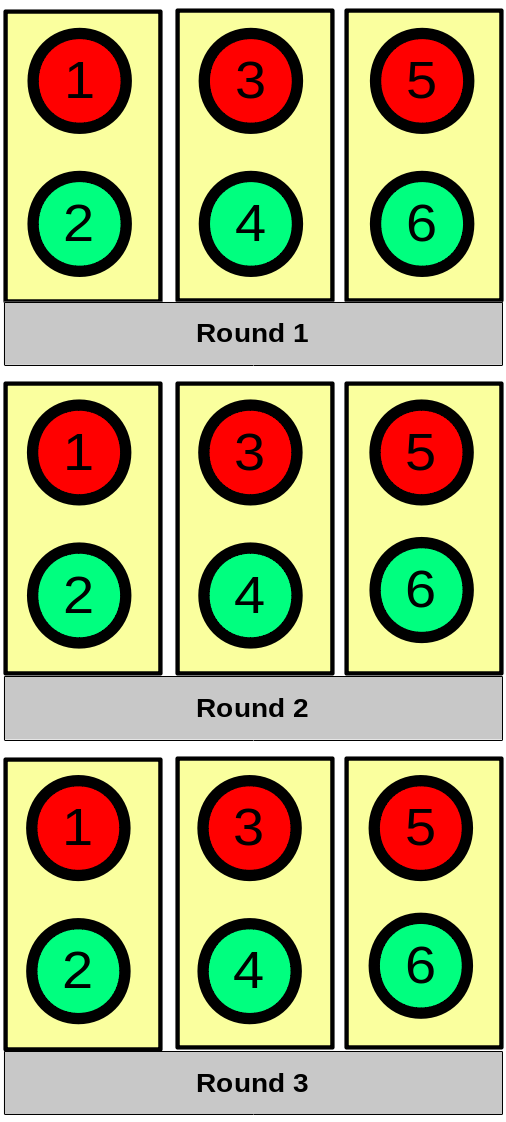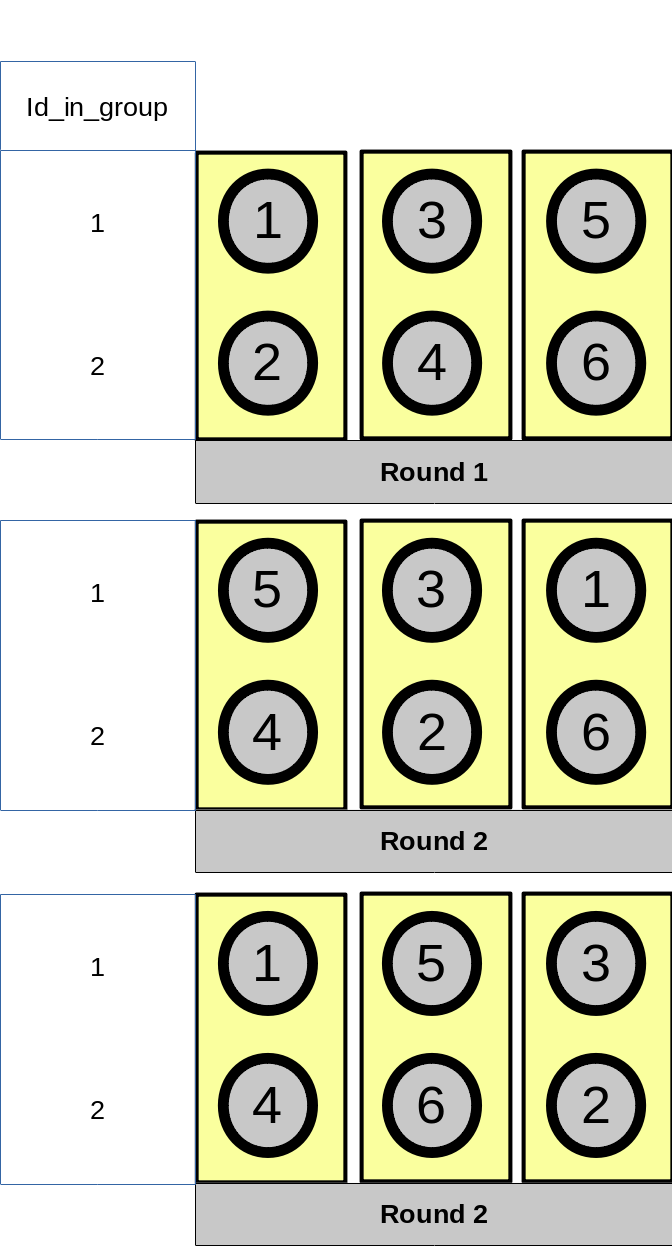Matching with Roles¶
Random matching when the roles are constant¶
In the Practice: Trust Game and the Roles sections, we defined the roles based on the player attribute id_in_group. This is the easiest and the most convenient way most of the time. As we seen previously this can work out of the box.

Fig. 19 Default matching when we have the roles defined on id_in_group. 1 for red player , 2 for green player.¶
However recall that, in the random matching example in the previous page, Player 1 and all the other players can be either in the first or the second position in their group list. Their position in their group coincides with their id_in_group.
In some cases we would like to keep the id_in_group constant for each player. Luckily, group_randomly() have a feature to shuffle the groups while keeping the id_in_group constant.

Fig. 20 The method with the argument, group_randomly(fixed_id_in_group=True) shuffles players in a way that each player is in the same id as before.¶
We can obtain this behavior by adding fixed_id_in_group=True argument in group_randomly:
class Subsession(BaseSubsession):
def creating_session(self):
self.group_randomly(fixed_id_in_group=True)
We can also confirm with our output of get_group_matrix():
== Round 1 ==
Matching: [[<Player 3>, <Player 2>], [<Player 1>, <Player 4>], [<Player 5>, <Player 6>]]
== Round 2 ==
Matching: [[<Player 1>, <Player 4>], [<Player 3>, <Player 6>], [<Player 5>, <Player 2>]]
== Round 3 ==
Matching: [[<Player 1>, <Player 2>], [<Player 3>, <Player 6>], [<Player 5>, <Player 4>]]
So our matching looks something like this:

Fig. 21 The method with the argument, group_randomly(fixed_id_in_group=True) shuffles players in a way that each player is in the same id as before.¶
Putting it all together: Defining roles¶
Let’s say we would like to have two roles:
redandgreenWe would like to shufle groups in the first round keep constant for the rest.
Our models.py would look like this:
class Subsession(BaseSubsession):
def creating_session(self):
if self.round_number == 1:
self.group_randomly(fixed_id_in_group=True)
else:
self.group_like_round(1)
print("== Round " , self.round_number, " == ")
print(" Matching: ", self.get_group_matrix())
if self.round_number == Constants.num_rounds:
print("\n\n")
class Group(BaseGroup):
pass
class Player(BasePlayer):
def role(self):
if self.id_in_group == 1:
return 'red'
if self.id_in_group == 2:
return 'green'
== Round 1 ==
Matching: [[<Player 1>, <Player 4>], [<Player 3>, <Player 6>], [<Player 5>, <Player 2>]]
== Round 2 ==
Matching: [[<Player 1>, <Player 4>], [<Player 3>, <Player 6>], [<Player 5>, <Player 2>]]
== Round 3 ==
Matching: [[<Player 1>, <Player 4>], [<Player 3>, <Player 6>], [<Player 5>, <Player 2>]]
Using set_group_matrix()¶
* We can give a specific matching structure by using `set_group_matrix()` method in `Subsession` class. As `get_group_matrix()` gives us a nested list of groups of player objects, we should constract the same structure.
* To do that, first we need to get player objects (`self.get_players()` or the original matrix (`self.get_group_matrix()`)
* We can also do that by providing a nested list of integers instead of player objects. Each integer represents player's `id_in_subsession`. For instance:
class Subsession(BaseSubsession):
def creating_session(self):
grouping = [[1,2],[4,3],[5,6]]
self.set_group_matrix(grouping)
This gives us the output:
== Round 1 ==
Matching: [[<Player 1>, <Player 2>], [<Player 4>, <Player 3>], [<Player 5>, <Player 6>]]
== Round 2 ==
Matching: [[<Player 1>, <Player 2>], [<Player 4>, <Player 3>], [<Player 5>, <Player 6>]]
== Round 3 ==
Matching: [[<Player 1>, <Player 2>], [<Player 4>, <Player 3>], [<Player 5>, <Player 6>]]
== Round 4 ==
Matching: [[<Player 1>, <Player 2>], [<Player 4>, <Player 3>], [<Player 5>, <Player 6>]]
